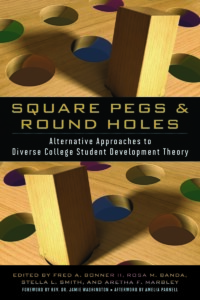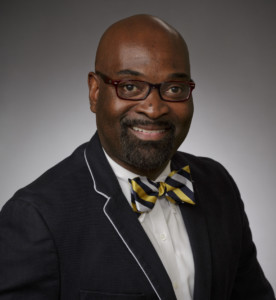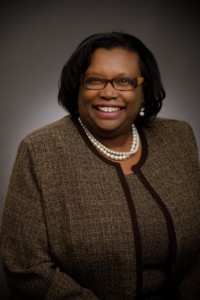PRAIRIE VIEW, Texas (April 27, 2021) – A new book, co-edited by Drs. Fred A. Bonner II and Stella L. Smith of Prairie View A&M University (PVAMU), has been released by leading higher education publisher Stylus Publishing. Square Pegs and Round Holes: Alternative Approaches to Diverse College Student Development Theory seeks to provide student affairs administrators and other professionals with alternative models to better serve diverse student populations, including Black, Asian American, Latinx, LGBTQIA, Native American, and bi- and multiracial students.
Bonner, the founding executive director of the Minority Achievement, Creativity and High-Ability (MACH-III) Center at PVAMU, who is also a professor and endowed chair in PVAMU’s Department of Educational Leadership and Counseling, says Square Pegs can be seen as a complement to the traditional research that has long served as the foundation of student development theory.
“The whole premise of the book is that a majority of theorists in the field of higher education are white,” Bonner said. “The cornerstone theories that are used in the field of college student development are pretty much all normed on white males and females, and primarily white male populations. This book is saying that we have to have some alternative theories that bring in the perspectives of people of color.”
Smith said, “They know they need to approach these students in a different way to support their development in higher education, but what they’ve been taught is this certain set of strategies.” Smith currently serves as MACH-III’s associate director. “The book provides them with another set of tools and strategies to consider as they’re working with different populations of students. We view it as a supplement to the classical learning — we’re not trying to supplant that learning, we’re trying to extend it.”
Smith added that as higher education changes, all faculty need to “broaden their minds” about how they support students. “I think what’s so special about the book is that it’s approaching underrepresented populations from an asset-based model,” she said. “Often when we talked about students with different experiences, it was always about making sure you brought them to this or that level, but it discounted all the experiences they brought in, which are assets that help them be who they are. The theories in the book help student affairs administrators and professionals really support and recognize the whole student by acknowledging all those experiences they’re bringing to the table. It’s really important.”
As lead editor, Bonner guided the book’s development in support of his research agenda, reaching out to scholars interested in writing about the topic and writing (with Smith and the book’s other co-editors) its introductory chapters. The book is consistent with Bonner’s new journal published by Penn State Press, Journal of Minority Achievement Creativity and Leadership (JMACL), and edited volume Building on Resilience, which foregrounds the narrative about the success of Black males in education. That said, Bonner said he’s “most excited” about the chapters on Native American students “because the particular population is so undertheorized in the literature.”
While the first-line audience for Square Pegs will be faculty who teach in higher education student affairs programs, both Bonner and Smith hope that the subject will pique the interest of professionals working in Greek life or housing, and even among the general public.
“I consider it a benchmark and an extension of the literature,” Smith said. “We don’t want it to go on a shelf somewhere. We really want it to be applicable and accessible, and to spur conversation, and different kinds of thinking.”
“People hear me in the academic sphere, and when I share our research with folks out in the community, they say, ‘Why aren’t you in the Houston Chronicle, or out talking to Black churches?’” Bonner said. “As academics, our world kind of spins inside the academy, but we need to get the message of support of different student populations out into the mainstream.”
By Andrew Cohen
-PVAMU-



